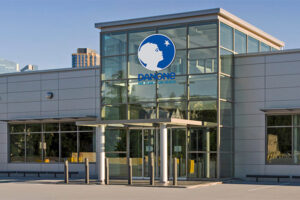By Susanne Osadnik
Everything is fine in Bochum. In Hamburg too. Because everything is still running smoothly in Bochum. The people in Hamburg are particularly glad about this, since, in times of corona, it is by no means a matter of course that a construction site runs as it should. But in the deep west of Ruhr these things actually work and lets the Hanseatische Betreuungs- und Beteiligungsgesellschaft (HBB), which is responsible for the “Viktoria Karree” project, rejoice: It looks like the completion date in 2022 seems to hold. And since 90 percent of the available sales area has already found its tenants, the guys in Hamburg are relaxed. “We already won over these tenants before the corona pandemic started,” says Harald Ortner, Managing Director of HBB. “Now, everybody must understand that there will hardly be any more lease negotiations until the end of the year.”
The new mall is supposed to breathe new life into the city that once was one of Europe’s biggest mining towns and close the gap between Kortumstraße, Husemannplatz, Viktoriastraße, and the Ring. The Viktoria Karree comprises a total leasable area of 38,000 sq m, which will place the mall in the same category as Nuremberg’s Franken-Center, Munich’s Pasing Arcaden and Frankfurt’s Hessen-Center.
Open system instead of closed-off concrete block
However, this is where the similarities to these centers end, as the City of Bochum deliberately decided against a closed shopping center in favor of an open system. Contrary to other comparable malls, like Dortmund’s Thier-Galerie or Duisburg’s Forum, all stores in Bochum’s new shopping hot spot will have their individual entrances. Many centers would be very grateful for this concept in times of corona because their customers would not have to walk through the entire building to find one specific store. Moreover, each store can have just as much fresh air as they want by opening or closing its shop doors individually.
However, a virus that restricts retail on a worldwide scale was not part of the reasoning for Viktoria Karree’s design. It was already clear that future-oriented shopping centers have to open themselves towards their cities and their residents. After all, “inner cities can do almost anything better than malls–and they are more attractive in most cases,” says Christoph M. Achammer. “We have to find out as quickly as possible how we can realize large-scale shopping environments in inner-city structures.”
According to the architect and professor with a chair for integral building design and industrial building at the Institute for Interdisciplinary Construction Management in Vienna, the only sensible way was very clear long before the coronavirus struck: “Shopping centers have to become parts of their respective cities. This is the only way for them to even have future,” says Achammer, who is a member of the ACROSS Advisory Board.
People still want collective proximity
Even though many things are changing right now in times of home office, distancing regulations, and travel restrictions, the man who considers it his duty to “consistently cause trouble” in his role as chairman of ATP architects engineers believes that people still want to come together and experience collective proximity. “Our desire to experience physical proximity with friends, families, and like-minded people has never been bigger than right now, in these times of uncertainty,” says Achammer. “Managing these requirements will be the challenge for future shopping centers. Nobody needs even a single square meter more to satisfy the customers’ shopping demands. What we actually need are places where people can come together.”
Many retail real estate experts see that high-frequency centers, which depend on high visitor numbers from people from out of town, have a particularly hard time right now. Their entire architecture is geared towards keeping customers in these buildings for as long as possible with forced guidance. However, this is exactly what is not needed right now: People want to avoid contact wherever possible, keep their distance, and only stay in enclosed spaces as long as necessary. The consequence is that people stay at home and order online.
Hybrid shopping becomes the new normal
According to Stefan Mitropoulos, real estate analyst at Landesbank Hessen Thüringen (Helaba), shopping centers would have to “develop new and creative concepts. Centers were caught in a perfect storm by focusing on retail and gastronomy.” Marketplaces could be created and affluent customers could be attracted by incorporating regional providers. “It is not enough to convert sales areas into food boulevards if you want to ensure a center’s future,” says Mitropoulos. Right now, many centers would already benefit from basic reconstruction measures like side wall and roof openings to get some fresh air into the currently completely enclosed centers and reduce the risk of infection.
However, entirely different measures will be necessary to achieve success in the long run, according to real estate experts. For many observers, the current crisis is merely the accelerant for a development that is already in full swing: the digitization of retail, which will decrease demand for sales areas and result in declining rents. “Hybrid shopping will become the new normal,” says Achammer. “However, retail is still not equipped for it and does not fully understand how to combine online with offline. This situation needs to improve.“ Those who see digitization for what it is–the pragmatic and therefore dispassionate procurement of goods–have the chance to draw the right conclusions from the decreasing demand for sales areas and declining customer frequencies and create the future with substantial structural modifications. “We have to create vibrant environments that make one’s stay pleasant again,” Achammer strongly believes. This includes the qualitative enhancement of gastronomy offers and the creation of “hang-outs” where people actually want to stay.
Concessions from construction companies?
However, these kinds of revitalization measures are capital-intensive and construction costs may increase even further. “The construction industry is already working at capacity due to many residential projects,” says real estate analyst Mitropoulos. “In addition to that, they are now getting further projects from the public sector, since the corona crisis has shown that kindergartens and schools desperately need to be modernized to meet the hygienic requirements that have increased due to the pandemic.” Furthermore, the costs for foreign workers may increase as well, according to the assessment of Günter Vornholz, professor of real estate economics at the EBZ Business School in Bochum. “The numerous corona-cases in the meat industry have shown that the cheap mass accommodations, which were provided for workers from Eastern Europe until recently, entail a much too high risk of infection.” The construction business is facing a similar problem.
HBB boss Harald Ortner, who is responsible for several construction projects, is currently experiencing the opposite situation. “Normally, the construction industry is booked for years. Now, however, there is a lack of follow-up projects and construction companies are therefore willing to make concessions,” says Ortner. “The current situation provides opportunities for negotiations.”






